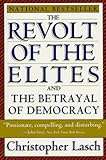The Revolt Of The Elites

The Revolt of the Elites: And the Betrayal of Democracy
by the late historian, moralist, and penetrating social critic Christopher Lasch is a sobering and shockingly blunt appraisal of democracy in the new American economy.
The Revolt of the Elites is, at best, a disturbing and difficult work to read. Irrespective of your political philosophies, you will likely be bothered and/or offended by some of Lasch’s assertions and conclusions that a presented in this book.
It’s an important work though and well worth the effort and pain it takes to read it.
In “the Revolt of the Elites” Christoper Lasch powerfully and persuasively contends that that the values and attitudes of professional and managerial elites and those of the working classes have dramatically diverged. Although the claim is controverted, many of us on the right (especially social conservatives) agree with the quasi-populist/communitarian notion that democracy works best when all members of society can participate in a world of upward mobility and of achievable status. In such a world, members of society will perceive themselves as belonging to the same team and care about ensuring that that team succeeds. But how can society achieve this sort of mutual interdependence if its members are not part of a community of shared values? As Christopher Lasch explains: “[T]he new elites, the professional classes in particular, regard the masses with mingled scorn and apprehension.” For too many of these elites, the values of “Middle America” – a/k/a “fly-over country” – are mindless patriotism, religious fundamentalism, racism, homophobia, and retrograde views of women. “Middle Americans, as they appear to the makers of educated opinion, are hopelessly shabby, unfashionable, and provincial, ill informed about changes in taste or intellectual trends, addicted to trashy novels of romance and adventure, and stupefied by prolonged exposure to television. They are at once absurd and vaguely menacing.” (28)
The tension between elite and non-elite attitudes is most pronounced with respect to religious belief. While our society admittedly is increasingly pluralistic, “the democratic reality, even, if you will, the raw demographic reality,” as Father Neuhaus has observed, “is that most Americans derive their values and visions from the biblical tradition.” Yet, Lasch points out, elite attitudes towards religion are increasingly hostile: “A skeptical, iconoclastic state of mind is one of the distinguishing characteristics of the knowledge classes. … The elites’ attitude to religion ranges from indifference to active hostility.” (215)
Lash claims that the divergence in elite and non-elite attitudes is troubling for the future of democracy. Its hard for me to gainsay him. Yet, while “The Revolt of the Elites” is sobering – even a tad depressing – it deserves to be read even more widely than it has been. Lasch is no partisan. Conservative proponents of unfettered capitalism get bashed about the head by Lasch just as much as liberal critics of capitalism. Populists will find themselves nodding in agreement with some sections, while communitarians will concur with other sections. About the only folks who will be offended by all of “The Revolt of the Elites” are hardened libertarians and extreme left-liberals.
Christopher Lasch’s final question in this work, which was the last of his to be published during his lifetime, was a very important and chilling one: can a society survive when a significant portion of its elite have forsaken its founding principles?

